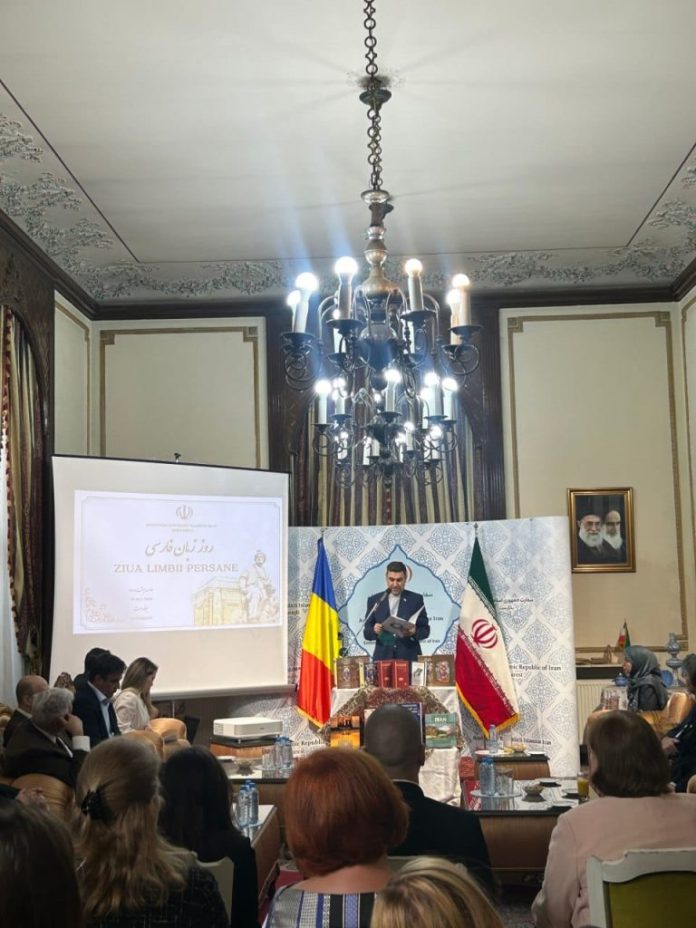The Ambassador of the Islamic Republic of Iran, H.E. Seyed Hossein Sadat Meidani, said on the occasion of Persian Language Day that persian literature has the power to promote peace.
- On May 13 (25 Ordibehesht in the solar calendar), Iranians and Persian speakers around the world celebrate Persian literature on the occasion of Persian Language Day, which marks the birth of the great poet of Persia, Hakim Abul Qasim Ferdowsi.
The Persian language is spoken by millions of people around the world. It blends cultures and promotes mutual understanding. In addition, estimates suggest that around 1.5% of websites worldwide use Persian, which puts it in tenth place among the world’s languages. However, Persian is not just a means of communication; it is a literary treasure. For over two millennia, it has been the cradle of magnificent poetry, captivating stories and profound philosophical works.
Persian literature has the power to promote peace within individuals and, by extension, within society as a whole. By immersing ourselves in the works of Rumi, the great Iranian poet, known for his message of love and tolerance, or Saadi, another important Iranian poet, who championed reason and compassion, we encounter philosophies that stand in stark contrast to war and violence.
Romania and Iran are in geographical regions affected by war and conflict, so this year I would like to address a more complex topic from Shahnameh: war and humanity during war in Ferdowsi’s vision. Shahnameh is a huge epic poem, a literary masterpiece that tells us about Persia, or Iran, from the creation of the world to the 7th century AD. It also records the rise and fall of dynasties, the triumphs and tragedies of heroes, and the enduring spirit of the Iranian people. But the significance of the Shahnameh transcends its historical and literary values. At the same time, it offers valuable lessons that resonate with the concepts of jus ad bellum (the law of the use of force, enshrined in the 1945 UN Charter) and jus in bello (the law of war, enshrined in the 1949 Geneva Conventions).
The concept of war and peace in Shahnameh
War is a recurring theme in Shahnameh, reflecting the realities of the period it represents. However, Ferdowsi does not glorify war. He explores its complexity and consequences, presenting a multi-layered view:
The Brutality of War: Shahnameh does not shy away from describing the horrors of war. Ferdowsi describes the suffering of soldiers and civilians, the devastation of land and the emotional burden of conflict.
The Value of Diplomacy: Wise leaders and warriors like Rostam in Shahnameh are shown to resort to diplomacy and negotiation whenever possible to avoid bloodshed. They understand the benefits of peaceful coexistence.
I came here today without pursuing war
I seek the opposite, and that is dialogue and credibility.
Defending justice and honour: Many wars in Shahnameh are fought to defend justice, honour and the Iranian homeland from tyranny or aggression. Here, war is seen as a necessary evil, a means to restore order and uphold justice.
Respect for human life during war in Shahnameh
While Shahnameh represents a world of war and conflict, it is important to note that righteous heroes and kings often demonstrate respect for the human right to life. Here are a few examples:
Pahlavani in Battle: Similar to chivalry, Pahlavani emphasized the importance of courage, fighting for a just cause, and defending all the weak. Warriors like Rostam, despite their immense power, are known for avoiding unnecessary bloodshed. They often give their opponents a chance to surrender or fight a fair duel. This reflects a sense of honor and respect for worthy opponents. Heroes like Rostam often demonstrate a sense of Phalavani towards women, even those considered enemies. They can avoid hurting them in battle or offer them safe passage.
Mercy to the Weak: Righteous kings like Kaykavus are shown to be merciful to the weak or unfortunate. They understand the importance of protecting civilians and innocent lives during war.
Value of Life: The poem often mourns the loss of life, even in war. Passages mourn fallen heroes and innocent victims, reflecting a deep understanding of the preciousness of human existence.
Shahnameh does not glorify indiscriminate war. We see instances where heroes prioritize the safety of non-combatants. A sense of chivalry and honor motivates them to distinguish between warriors and those not actively engaged in battle.
God will not be pleased
if innocent civilians are harmed
Mercy to the wounded: Shahnameh shows acts of mercy towards the wounded, even on the battlefield. Heroes may provide medical aid or safe passage to wounded enemies, recognizing the common humanity that transcends conflict.
It is important to remember that Shahnameh is a product of his era. War and resort to violent means were realities of life. However, he also emphasizes their devastating consequences and the importance of pursuing peace whenever possible. At the same time, it stresses the importance of respect for life, especially for those heroes and leaders guided by a strong sense of justice and honour.
So we can clearly say that Shahnameh and the UN Charter are aiming for a world where conflict is a last resort, where diplomacy and dialogue are a priority, and where even in war, basic human dignity is respected. In this sense, Shahnameh can be seen as a powerful testimony to humanity’s aspirations for peace that inspired the creation of the United Nations. As we celebrate Persian Language Day, we also celebrate the rich culture from which it sprang. A culture that spurred innovation in science, art and architecture. A culture that has embraced diversity and dialogue throughout history. Let us give sincere thanks to all those who contribute to the promotion of Shahnameh and wish for a peaceful world where we can see the day when we can save future generations from the curse of war.




